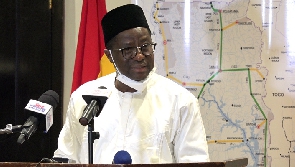Opinions of Wednesday, 28 May 2014
Columnist: Dekportor, Chris Mensah
The National Economic Forum: A Practical Perspective
One positive aspect of the recently held National Economic Forum was no doubt the assembling of experts and people of diverse backgrounds and inclinations to dialogue and make recommendations on the way forward for Ghana’s economy. The recommendations that emerged out of the forum are largely general in scope and adopt the top down approach to transforming the economy of Ghana. They are generally designed to impact the macro level of the economy.
In recommending a path for economic transformation as attempted at the Forum, it is easy to generalize by selecting a few countries that are deemed to have transformed their economies and recommend that their model for transformation be replicated in Ghana. However in reality each country’s path to development is shaped by its peculiar circumstances including its strength and weaknesses, and how these are managed to ensure transformation.
For instance, chieftaincy, as we have it in Ghana and its impact on our social economy, is a rarity in most parts of the world. Thus to implement any economic policy strategy in Ghana and ignore the impact of the institution in the scheme of things may not be prudent. It is therefore relevant to do a detailed study on the role of chiefs in Ghana’s socio economic setting to determine how best to utilize the institution to positively affect any economic transformation strategy in Ghana.
Whether we like it or not the chieftaincy institution is very significant and pervasive in Ghana, and largely operates parallel to central and local government. Thus any strategy at economic transformation that underestimates its role and impact is destined to succeed marginally if at all.
It is prudent strategy therefore that any policies for economic transformation in Ghana should be practical to a fault, and take into consideration the peculiarities strengths and weaknesses of our country. In this regard, the government’s strategy of resorting to a homegrown approach at economic transformation may be appropriate if reference to a homegrown approach relates to harnessing and managing the strengths and peculiar circumstances of the country in order to positively attain economic transformation. This also implies identifying and analyzing our weaknesses as a nation, and devising strategies to eliminate them or manage them such that they do not continue to negatively affect our effort at economic transformation.
For instance it is obvious that the profile of Ghana and Ghanaians as a friendly and peace loving country and people is a strength that can be harnessed to develop a robust tourism industry. But what do we see? Our Tourism sector is largely unplanned and uncoordinated to unleash the thousands of jobs that can potentially be created in this sector of the economy alone. There is for instance no widespread and publicized policy strategy that is designed to preserve our beaches in order to promote beach tourism on a massive scale in Ghana.
Likewise a policy that emphasizes good access to our tourist sites is not given prominence in the country. Try visiting the Wli Falls and you would appreciate this point. The good potential of this site is largely hampered by its access which is a disincentive to visiting the place.
Is it not prudent policy for the Ministry of Local Government to direct district and municipal assemblies to give priority to access roads leading to tourists sites in their localities?
Ghana has reached a point as a country which calls for focus at every stage of government structure and innovative leadership that devises home grown policies for economic transformation. Policies which take into consideration the strengths, weaknesses and peculiarities of our country are the ones which would make the most impact and give birth to real economic transformation.
If it is agricultural transformation that we desire, we should triple the incentives for local and foreign investors in the agric sector of Ghana. Policies such as tax holidays for investors in this sector should be emphasized alongside zero or very low duties on agricultural equipments and implements. Policies that create local markets for investors in Agric across board should also be emphasized as is currently being done for poultry farmers.
If it is industrial transformation that we desire, we should review current policy that emphasizes revenue generation on the back of the few industries that we have, which makes their costs of production high and uncompetitive. We should for instance introduce zero to very low duties on imported raw materials and tax holidays for investors in industries in Ghana in order to attract industries that employ thousands into the country to create employment avenues for our youth. The policy strategy should be to create an environment of low cost of production for our industrial sector in order to enable the sector emerge and compete globally. Revenues can be generated in various ways when industrial expansion takes place. Emphasizing revenue generation on industry at their inception stage in an economy with a low industrial base such as Ghana is not a good and prudent policy.
Generally, we can examine various sectors of our economy and implement innovative policy strategies that can rejuvenate the economy and unleash the economic transformation that we all desire.
Government officials should also work with urgency and shun policy prescriptions and work habits that slow down the drive towards economic transformation. For instance, there is absolutely no justification for any policy that takes six months to over a year to appoint a transaction advisor to implement any government project. It should not take more than three months to appoint such an advisor if we really seek to transform our economy with dispatch. We should by now for instance as a matter of urgency have a policy of railway sector transformation in place that we are implementing with seriousness and which the general public is conscious of.
There are models for establishing railways and airlines and such other vehicles of economic transformation worldwide that we can access and implement with dispatch.
Institutional inefficiencies and bottlenecks should therefore also be highlighted and eliminated in order to quicken the pace of any policy for economic transformation.
Going forward, we should aim at implementing policies that make our country competitive globally, and apply innovative strategies that harness our strengths and resources for economic transformation. The experts have had their say at Senchi but the real deal is in policy strategies targeted at the micro level so as to unleash the sleeping giant in Ghana. In this regard, Government officials and public servants who lack the ability to operate with dispatch should be replaced with those who are ready to meet timelines required for economic transformation.
We should also as a nation emphasis judicious use of our resources to attain economic transformation. For instance why should we continue as a general policy to construct open gutters which in the long run impose more costs on our economy instead of sidewalks which improve the quality of life of Ghanaians in many ways? Open gutters generally only serve as breeding grounds for mosquitoes and negatively impact the nation’s total health care costs.
We should therefore place emphasis on innovative value for money policy strategies in order to attain the desired economic transformation that we aspire to achieve. The National Economic Forum was useful, but its implementation stage should emphasis practical and innovative measures in order for it to set the country on the path to true and visible economic transformation.
“Therefore let us begin to build Ghana with a united sense of purpose so we can build a Ghana that generations yet unborn will be proud of "
Remember, Ghana will not die but we shall all live to see the light of the day.
God bless our lovely Nation, Ghana.
Report By: Mensah Dekportor. (Hamburg)
Germany NDC Communication Director
Email: cmdekportor@gmail.com












